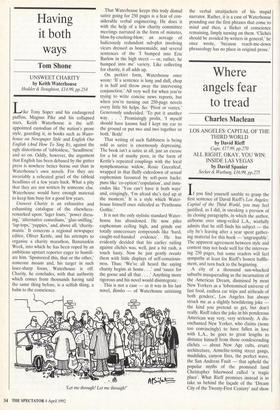Having it both ways
Tom Shone
UNSWEET CHARITY by Keith Waterhouse Hodder & Stoughton, £14.99, pp.254 Like Tony Soper and his endangered puffins, Magnus Pike and his collapsed stars, Keith Waterhouse is the self- appointed custodian of the nation's prose style, guarding it, in books such as Water- house on Newspaper Style and English Our English (And How To Sing It), against the ugly distortions of labloidese,"headlinese' and so on. Oddly, however, the argument that English has been debased by the gutter press is nowhere better borne out than in Waterhouse's own novels. For they are invariably a reheated gruel of the tabloid headlines of a few years back. What a pity that they are not written by someone else. Waterhouse would have enough material to keep him busy for a good few years.
Unsweet Charity is an exhaustive and exhausting catalogue of the elsewhere- remarked upon: lager louts,' power dress- ing,' alternative comedians,' glue-sniffing,' `lap-tops,' yuppies,' and, above all, `charity- mania.' It concerns a regional newspaper editor, Oliver Kettle, and his attempts to organise a charity marathon, Bananaskin Week, into which he has been roped by an ambitious upstart reporter eager to humili- ate him. `Sponsored this, that or the other,' someone moans and, his target in such laser-sharp focus, Waterhouse is off. Charity, he concludes, with that authority which comes from thousands having said the same thing before, is a selfish thing, a balm to the conscience. That Waterhouse keeps this truly dismal satire going for 250 pages is a feat of con- siderable verbal engineering. He does it with the help of a few charity committee meetings narrated in the form of minutes, blow-by-crushing-blow; an acreage of ludicrously redundant sub-plot involving vicars dressed as housemaids; and several sentences of the `I bumped into Eric Barlow in the high street — or, rather, he bumped into me' variety. Like collecting for charity, it all adds up.
On perkier form, Waterhouse once wrote: `If a sentence is long and dull, chop it in half and throw away the intervening conjunction.' All very well for when you're trying to write concise news reports, but when you're turning out 250-page novels every little bit helps. So: `Pivot or vortex.' Generously undecided. `To put it another way. . . .' Promisingly prolix. `I myself should have known had I kept my ear to the ground or put two and two together or both.' Both!
That writing of such flabbiness is being sold as satire is enormously depressing. The book isn't a satire at all, just an excuse for a bit of mushy porn, in the form of Kettle's repeated couplings with the local nymphomaniac widow, Rosie Greenleaf, wrapped in that fluffy eiderdown of sexual euphemism favoured by soft-porn hacks: puns like `co-optionTcopulation', and innu- endos like 'You can't have it both ways' and, cringingly, `I'm afraid she's tied up at the moment.' It is a style which Water- house himself once ridiculed as `Penthouse Gothic.'
It is not the only stylistic standard Water- house has abandoned. He now piles euphemism ceiling high, and grinds out totally unnecessary compounds like `hard, caught-red-handed evidence'. He has evidently decided that his earlier railing against clichés was, well, just a bit rash, a touch hasty. Now he just gently tweaks them with little displays of self-conscious- ness. Thus: `We've all heard the saying charity begins at home . . .' and `sauce for the goose and all that . . . .' Anything more rigorous and his novel would disintegrate.
This is not a case — as it was in his last novel, Bimbo — of Waterhouse satirising 'Let me through! Let me through!'
the verbal straitjackets of his stupid narrator. Rather, it is a case of Waterhouse pounding out the first phrases that come to mind and then, a flicker of conscience remaining, limply turning on them. `Clichés should be avoided by writers in general,' be once wrote, `because reach-me-down phraseology has no place in original prose.'


























































 Previous page
Previous page